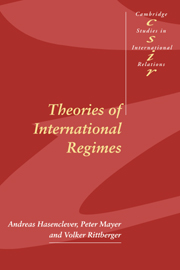Book contents
- Frontmatter
- Contents
- List of figures and tables
- Acknowledgments
- 1 Introduction: three perspectives on international regimes
- 2 Conceptual issues: defining international regimes
- 3 Interest-based theories: political market failure, situation and problem structures, and institutional bargaining
- 4 Power-based theories: hegemony, distributional conflict, and relative gains
- 5 Knowledge-based theories: ideas, arguments, and social identities
- 6 Conclusion: prospects for synthesis
- References
- Index
- CAMBRIDGE STUDIES IN INTERNATIONAL RELATIONS
2 - Conceptual issues: defining international regimes
Published online by Cambridge University Press: 05 September 2009
- Frontmatter
- Contents
- List of figures and tables
- Acknowledgments
- 1 Introduction: three perspectives on international regimes
- 2 Conceptual issues: defining international regimes
- 3 Interest-based theories: political market failure, situation and problem structures, and institutional bargaining
- 4 Power-based theories: hegemony, distributional conflict, and relative gains
- 5 Knowledge-based theories: ideas, arguments, and social identities
- 6 Conclusion: prospects for synthesis
- References
- Index
- CAMBRIDGE STUDIES IN INTERNATIONAL RELATIONS
Summary
More than a decade ago, Susan Strange (1983) directed a volley of criticisms against the study of international regimes, which has earned her the status of the almost ritually cited radical critic of this research program. One of the reasons why she saw regime analysis doomed to failure was the “imprecision” and “woolliness” of the concept of international regime. Much of the scholarly discussion revolving around this concept, she suspected, was attributable to the fact that “people mean different things when they use it” (Strange 1983: 343). Doubts about the utility of the concept in its present form have not been confined to radical critics, though. Scholars much more favorable to the study of regimes such as Friedrich Kratochwil and John Gerard Ruggie (1986: 763) have conceded Strange's point and called for efforts at conceptual development. Oran Young (1989a: 9) went so far as to complain that “the whole enterprise of regime analysis continues to rest on a shaky foundation,” explaining that “[t]he concept of a regime itself is often used so loosely that critics have reasonably questioned whether the concept is anything but a woolly notion likely to produce more confusion than illumination.” Hence, it comes as no surprise that during the last decade several attempts have been made to clarify, modify, or even supplant the so-called consensus definition of the term “international regime,” which Strange had in mind when she formulated her skepticism concerning the regime concept.
- Type
- Chapter
- Information
- Theories of International Regimes , pp. 8 - 22Publisher: Cambridge University PressPrint publication year: 1997



